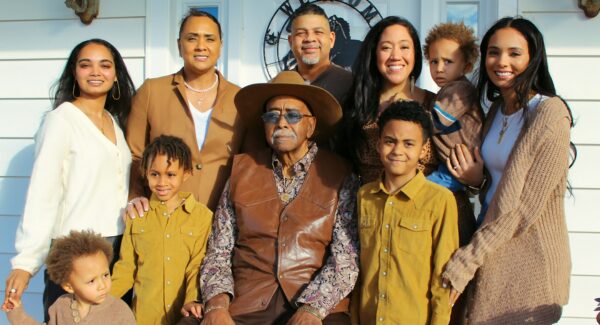Inside the World of Chance McClain’s Heritage Films and the Power of Storytelling That Heals Generations
by Carole Dean
What If Your Story Was the Movie?
Not a highlight reel or a TikTok trend, but a real film—shot with intention, structured like a classic narrative, and passed down like a family heirloom.
For Chance McClain, this isn’t a hypothetical. It’s his daily work. As the founder of Heritage Films, Chance has directed and produced over 800 cinematic life stories—each one a personal documentary, each one crafted with the tools of serious independent filmmaking.

“These aren’t vanity projects,” Chance says. “These are stories people need. They’re about memory, connection, and honoring the people who shaped us.”
In a recent episode of The Art of Film Funding Podcast, I sat down with Chance to uncover how a man with a background in sports radio, Broadway, oil sales, and filmmaking came to redefine the documentary space for families.
What follows is not only a story of innovation—but a masterclass for indie filmmakers looking to blend heart with high craft.
It Started with a Simple Ask
Like many great stories, Chance’s journey started with a favor.
“A friend said, ‘Can you film my dad? He’s turning 75 and I want my kids to know who he is,’” Chance recalls. “I had no training in that kind of interview filmmaking. But I said yes. And that became the first one.”
What followed was deeply personal. After learning his own stepfather had stage four pancreatic cancer, Chance filmed him too. “He was told he had a year to live. It ended up being two months,” Chance shared. “That interview happened on a Tuesday. He passed that Sunday.”
That was the turning point. “My wife and I realized—it’s not just a gig. This is something families need.”
Capturing Real People, Not Performances
Independent filmmakers often face the challenge of working with non-actors. Chance embraced that.
“Our number one goal? Make people forget the camera’s there,” he says. “We want real, authentic moments. I talk to them like I’m their neighbor. The gear fades into the background.”
Chance collects information from loved ones before the shoot—quirks, key memories, relationships—and layers it into the interviews. He uses this to uncover emotional patterns that reveal who someone really is. “If five people mention drill team, then drill team mattered. We follow the clues.”
The result? A fully structured documentary with rising action, emotional beats, and narrative payoff. “We use everything—McKee, Campbell, even ‘Save the Cat’—to shape these stories. We’re not just recording memories. We’re making movies.”
Storytelling with Production Value
From the beginning, Chance wanted his legacy films to look like feature films.
“I’ve worked on big movie sets. I love gear,” he laughs. “So I brought that level of production into people’s homes.”
But over time, the scale shifted. He learned that smaller crews, minimal lights, and intuitive technology created more comfort. “I’ve got camera feeds on a screen next to me now. I can adjust everything without breaking the subject’s focus. It’s just me and them. We’re talking.”
The approach balances intimacy with technical precision. It’s filmmaking—but rooted in service.
One Film, One Family, One Reunion
With over 800 films completed, some moments still stop him cold.
“There was a father in his eighties whose sons hadn’t spoken in 35 years,” Chance shared. “The film talked about the rift. I didn’t push it. Just included it.”
After the film was finished, one brother sent it to the other. “A month later, I get this long text—pages long. They reconnected. Their families were back together. Because of the story. Because of their dad.”
For Chance, it was proof: “These are just people in the neighborhood. They all have stories. They just need someone to listen.”
The Creative Toolbox of a Veteran Storyteller
Chance’s background is wildly varied—sports radio, Broadway musicals, the oil industry, the U.S. Army. But every experience shaped his ability to connect.
“Sales taught me how to listen and read people,” he says. “Radio taught me pacing. Theater taught me timing. And all of it taught me to find common ground.”
He credits Dale Carnegie’s How to Win Friends and Influence People for refining his approach. “Short questions, long answers. That’s my job.”
And when it comes to story structure, he leans on essentials. “Joseph Campbell, Robert McKee, and Brian McDonald’s Invisible Ink—those are my go-tos. Simple, solid, and true.”
Filmmaking Without Gatekeepers
While most indie filmmakers fight to get their films funded, Chance created a model where the audience is the funder.
“I tell families the cost. They fund the production. That’s it,” he says. “It’s like Kickstarter, but reversed. They’re commissioning the film and they’re the Executive Producers.”
And with word-of-mouth as his primary driver, Heritage Films has built a growing client base—including repeat clients. “We’ve had families order four or five different films. They want to preserve every branch of the tree.”
The Disney Philosophy: Experience Matters
For filmmakers looking to carve a path that’s meaningful, creative, and sustainable, Chance McClain’s journey offers this:
“You don’t have to wait for permission. Build something people need. Tell real stories. Stay true to structure. And never underestimate the power of a well-asked question.”
And maybe—just maybe—your next masterpiece won’t be a film for the masses. It might be a story that changes a single family forever.
“We’re not making movies for millions,” Chance says. “We’re making one movie that matters. And that’s enough.”
 Carole Dean is president and founder of From the Heart Productions.
Carole Dean is president and founder of From the Heart Productions.
From the Heart is a 501(c)3 non-profit that offers the Roy W. Dean Film Grants and fiscal sponsorship for independent filmmakers. She is creator and instructor of Learn Producing: The Ultimate Course for Indie Film Production. Essential classes for indie filmmakers on how to produce their films.
She hosts the weekly podcast, The Art of Film Funding, interviewing those involved in all aspects of indie film production. She is also the author of The Art of Film Funding, 2nd Edition: Alternative Financing Concepts. See IMDB for producing credits

